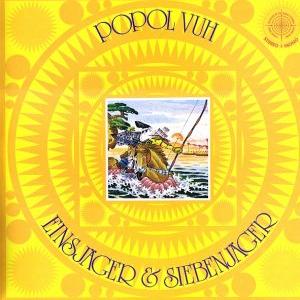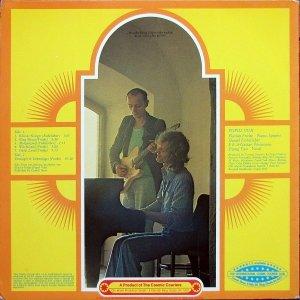Einsjäger & Siebenjäger
by Popol Vuh


Artist:
Popol Vuh
Label:
Kosmische Musik
Catalog#:
KM 58.017
Format:
Vinyl
Country:
Germany
Released:
1974
| Tracklist | |||
| A1 | Kleiner Krieger | 1:05 | |
| Notes: |
Written-By - Daniel Fichelscher |
||
| A2 | King Minos | 4:30 | |
| Notes: |
Written-By - Florian Fricke |
||
| A3 | Morgengruß | 2:55 | |
| Notes: |
Written-By - Daniel Fichelscher |
||
| A4 | Würfelspiel | 3:00 | |
| Notes: |
Written-By - Florian Fricke |
||
| A5 | Gutes Land | 5:13 | |
| Notes: |
Written-By - Florian Fricke |
||
| B | Einsjäger & Siebenjäger | 19:30 | |
| Notes: |
Written-By - Florian Fricke |
||
Credits
Flute - Olaf Kübler
Percussion, Acoustic Guitar, Electric Guitar - Daniel Fichelscher
Piano, Spinet - Florian Fricke
Producer - Popol Vuh
Vocals - Djong Yun
Notes
Produced for Cosmic Couriers by Popol Vuh at Bavaria Tonstudio, Munich, May 1974
Alle Texte von Salomo, bearbeitet von Florian Fricke
Strawberry Bricks Entry:
Under the guise of Popol Vuh, the Munich-based Florian Fricke created one of the most original bodies of work during the 1970s. His first two records were krautrock of the most kosmische type. Released in 1970, Affenstunde ("Monkey Hour") saw Fricke's hand on the Moog synthesizer; he was one of the first in Germany to own one. By 1972, he had switched to organ for the following In Den Gärten Pharaos (now recording for the Pilz/Ohr label), but had yet to find the quintessential Popol Vuh sound. Adding Conny Veit from Gila on guitar and Djong Yun on vocals, Hosianna Mantra approached bliss. The drum-less pieces floated high above the ebbing piano and soaring guitar runs; it's truly heavenly music. In 1973, Daniel Fichelscher from Amon Düül II joined on drums and guitar, and Popol Vuh's music finally turned ever-so-slightly toward the progressive. The next three albums comprised a trilogy based on biblical texts. Released in 1974, Einsjäger & Siebenjäger is perhaps the most "progressive" of this trio. Here, the music is built around the trio of Fricke (now exclusively) on piano, Fichelscher on guitar and drums, and Yun providing vocals. Encompassing the second side, the title track is a tour de force. Opening cautiously, it slowly builds momentum, until the drums finally kick in and Fichelscher's guitar playing takes off. He's got a clean tone (almost indistinguishable from Viet's) that complements Fricke's piano. Rooted in improvisation, the song doesn't seem to follow any structure other than its own. But even when interpreting darker moods, the music remains spiritual and uplifting, and effectively predates most new age music. Popol Vuh's next few albums would further what was started here, and reach a pinnacle with 1976's Letzte Tage - Letze Nächte. That same year, Fricke would score the soundtrack for Werner Herzog's Aguirre; and in so doing, established a relationship that would extend for decades and provide a further outlet for his music well into the 80s.

